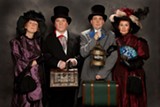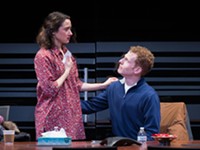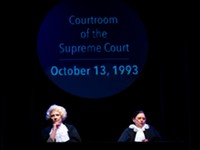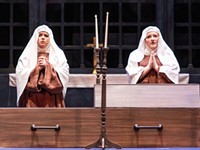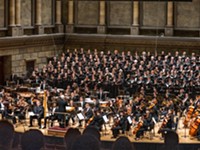[
{
"name": "500x250 Ad",
"insertPoint": "5",
"component": "15667920",
"parentWrapperClass": "",
"requiredCountToDisplay": "1"
}
]
Mention the name of Sir William S. Gilbert to most musical-theater fans, and their response is apt to be "...and Sullivan." Gilbert and his composing partner Sir Arthur Sullivan are indeed best remembered as collaborators on more than a dozen operettas, including "HMS Pinafore," "The Mikado," and "The Gondoliers." Considered the cream of Victorian musical theater, most of them are still performed frequently.
While they have passed into posterity with their names yoked, or simply referred to as "G&S", both Gilbert and Sullivan were famous in their own fields. Sullivan was a Victorian Leonard Bernstein, a respected conductor and successful composer of serious and light music. Gilbert's waspish personality and satiric bent found their outlet in poetry, short stories, and dozens of plays; he was in fact the first British writer to be knighted for his service to the theater.
The Off-Monroe Players have made a specialty of performing Gilbert and Sullivan since 1977, putting on two productions a year. Having cycled through the complete list several times over, the group recently began to investigate Gilbert's dramatic output, which includes many plays — serious and comic, long and short — that are almost never performed anymore, but worthy of revival. This weekend, Off-Monroe Players perform a unique triple bill of Gilbert's one-act comedies at Lutheran Church of the Good Shepherd.
When Gilbert wrote "No Cards" (1869) and "Eyes or No Eyes, or The Art of Seeing" (1875), he was a 30something, up-and-coming writer. They were produced by a theatrical company called the German Reed Entertainments, founded by Thomas German Reed and his wife in 1855 as a means of bringing theater to the Victorian middle class, in an era when theater was considered anything but respectable. The Reeds gave employment to many writers and musicians, including Gilbert and Sullivan before their collaboration.
The Reed aesthetic, and budget, was definitely "off Broadway". Each "entertainment" had a single domestic setting, and was limited to five characters — or, to be exact, five actors who occasionally played different characters, as they do in "No Cards." The Gilbertian twist here is that the disguised characters — one old, the other young and poor, vying for the hand of a wealthy young lady — aren't very good at their disguises. "No Cards" also contains a couple of songs showing Gilbert's nascent talent as a lyricist. (The title refers to the Victorian custom of presenting visiting cards on a social call.)
"Eyes or No Eyes" shows Gilbert in the "topsy-turvy" vein he exploited with Sullivan, taking a ridiculous premise and spinning a supposedly logical story from it. This is a tale of an imaginary magic cloak and its effect on the abundant self-interests of two sisters, their suitors, and an elderly couple.
Both short plays would please the most respectable Victorian audience, but they are also definitely Gilbertian, containing abundant verbal wit, a healthy vein of silliness, and light, but occasionally sharp, satire of Victorian mores. Fans of Gilbert with Sullivan will recognize some familiar turns of phrase that recurred in "The Mikado" and other operettas.
The final show on the OMP triple-bill is a brief parody of "Hamlet," "Rosencrantz and Guildenstern," which Gilbert wrote in 1874, long before Tom Stoppard had any ideas on the subject. This is a burlesque in the literary sense: a goof on a familiar literary work, a kind of "Saturday Night Live" sketch for Victorian Shakespeare fans — a group in which Gilbert definitely did not include himself. Gilbert's Claudius is a failed playwright, and his Hamlet is a very funny parody of overripe Shakespearian rhetoric and acting. (Gilbert, an accomplished amateur actor, played Claudius in a 1904 benefit performance of "Rosencrantz and Guildenstern" whose cast also included Gilbert's theatrical heir apparent, Bernard Shaw.)
This Gilbertian triple bill is directed by Albert Young and Charles Palella, who have long performing and directing resumes with Off-Monroe Players and other theater groups. (By the way, along with his other accomplishments, Gilbert was in many ways the first modern stage director, insisting that actors deliver his most outrageous lines with perfect naturalness and deadpan.)
Gilbert's plays are entertaining in themselves, but they also help promote the group's inclusive philosophy. "Doing these plays is a way to bring people onstage who may not get the focus in our regular G&S productions," says Young. The casts of all three plays include veteran Off-Monroe Players who are stepping out from the pirate or sailor or Japanese schoolgirl chorus for their close-ups, and given an opportunity to cut loose.
Fans of the Off-Monroe Players still love Gilbert with Sullivan, and the group will not be neglecting the G&S canon. It presented "The Pirates of Penzance" in November, and rehearsals start for the spring production, "Ruddigore," later this month. Any interested parties can join OMP shows, either performing or behind the scenes. Auditions are held for leading roles, but anyone can join the chorus — which plays an essential part in G&S.
